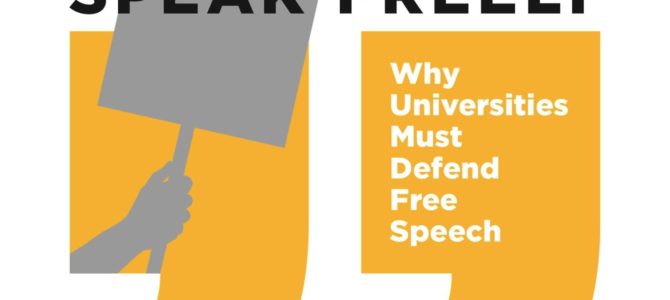
Keith E. Whittington, a professor of politics at Princeton University, calls his latest book, Speak Freely: Why Universities Must Defend Free Speech, a “reminder”—a term suggesting that we’ve forgotten something or that there’s something so important that we shouldn’t forget it. This something is the purpose of the modern university, which is, or should be, a refuge for open dialogue, rigorous debate, and the free exchange of ideas.
Safe spaces, trigger warnings, speaker disinvitations, speech zones, no-platforming, physical assaults against speakers—these are sure signs that some university cultures have become illiberal and intolerant, prioritizing indoctrination, orthodoxy, conformity, narrow-mindedness, censorship, and dogmatism over the unfettered pursuit of knowledge and wide dissemination of ideas.
Universities are not one-size-fits-all. The multiplicity among and between institutions of higher education in the United States, from community colleges to liberal-arts colleges to state flagship universities, makes generalizations about them impossible. Modern universities, however, are decidedly committed to research on the nineteenth-century German model. Whittington’s chief subject is this modern university, not religiously affiliated colleges guided by a core mission to spread and inspire doctrinal faith through formal education.
This is a very different model than, say, the distinctly Catholic university contemplated by Cardinal John Henry Newman in The Idea of a University that is predicated on the belief that scientific and philosophical knowledge is intimately tied to the revealed truths of the church. Whittington’s key focus appears to be on those institutions classified as doctoral research universities by the Carnegie Classification of Institutions of Higher Education. The gravest problem at such institutions is their coercive restrictions on speech.
Newly Relevant Free Speech Concerns
“My concern here,” Whittington says, “is with a particular problem on college campuses that is not new but newly relevant,” namely that “we are in danger of giving up on the hard-won freedoms of critical inquiry that have been wrested from figures of authority over the course of a century.” An ascendant intolerance jeopardizes free speech at universities, which have as their principal objective the formation and transmission of knowledge that itself depends upon free speech and inquiry.
To cultivate a liberal atmosphere tolerant of diverse views, universities must make room for marginalized voices and controversial ideas, submit received customs and conventions to continuous and critical examination, and welcome good-faith arguments that challenge cherished cultural norms and undermine accepted wisdom. Only by subjecting their beliefs to sustained scrutiny may scholars sharpen and refine their claims and achieve mutual understanding. Only by protecting the speech of dissenters from the shaming and retaliation of those who hold majority or dominant views may universities nurture the empathy and humility necessary to maintain constructive, scholarly conversations.
“[T]he value of free speech,” submits Whittington, “is closely associated with the core commitments of the university itself. The failure to adequately foster an environment of free speech on campus represents a failure of the university to fully realize its own ideals and aspirations.” More than that, such failure “subverts the very rationale for having a university and hampers the ability of universities to achieve their most basic goals.” To value the university is to value the free speech that characterizes the university’s goal and function.
In four succinct chapters, Whittington maps the history of the modern American university, demonstrating how free speech is integral to its mission and indispensable to the search for knowledge and understanding. The Jeffersonians’ opposition to the Sedition Act, and John Stuart Mill’s case against compelled silence in On Liberty, present seminal defenses of free expression that gave substance to the modern university’s commitment to vigorous deliberation and civil debate.
Universities Must Decide Where They Stand
Whittington shows that the free-speech ideal has always been contested on campus, its concrete manifestations differing from school to school and context to context. The tension, moreover, between protecting provocative speech and providing for student safety isn’t new. University administrators have long struggled to balance the promise of robust speech with the need for security in light of potentially violent backlash to offensive, incendiary utterances.
To those who abuse the system by inviting notorious speakers to campus to shout odious words that lack intellectual content and are meant only to shock and incite, Whittington offers this wisdom: “When we are making decisions about whom to invite to campus to speak, the goal should be neither to stack the deck with our closest allies nor to sprinkle in the most extreme provocateurs. The goal should be to make available to the campus community thoughtful representatives of serious ideas.”
The Charles Murrays of the world might enjoy more campus appearances, and more serious attention, if there were fewer speaking invitations to those grandstanding Milo Yiannopouloses, whose (typically) puerile messages and (typically) sophomoric style lack substantive intellectual content. Rather than Milo, why not invite one of the many conservative scholars who seek with sincerity and integrity to contribute to the sum of knowledge, but have been disenfranchised and dismissed by left-leaning faculty?
It’s not contradictory to celebrate free speech while urging restraint in selecting competent, well-meaning speakers. A dedication to pushing the limits of acceptable discourse is not, after all, the same as a dedication to learning the true and the good. Discerning the difference, however, is a task for the informed audience, not the campus censors. Suppressing foolish and fallacious ideas deprives students of the opportunity to learn what constitutes foolishness and fallaciousness.
Universities must choose: “They must decide whether they are committed to a joint project of learning and the principles and practices that make learning possible. If universities are to operate at the outer boundaries of our state of knowledge and to push those boundaries further outward, they must be places where new, unorthodox, controversial, and disturbing ideas can be raised and scrutinized.”
If universities cannot be counted on to expand the frontiers of knowledge, who or what will? This weighty question should cut across partisan lines and ideological camps and unite those of disparate backgrounds in a common cause: that of human progress and achievement.









